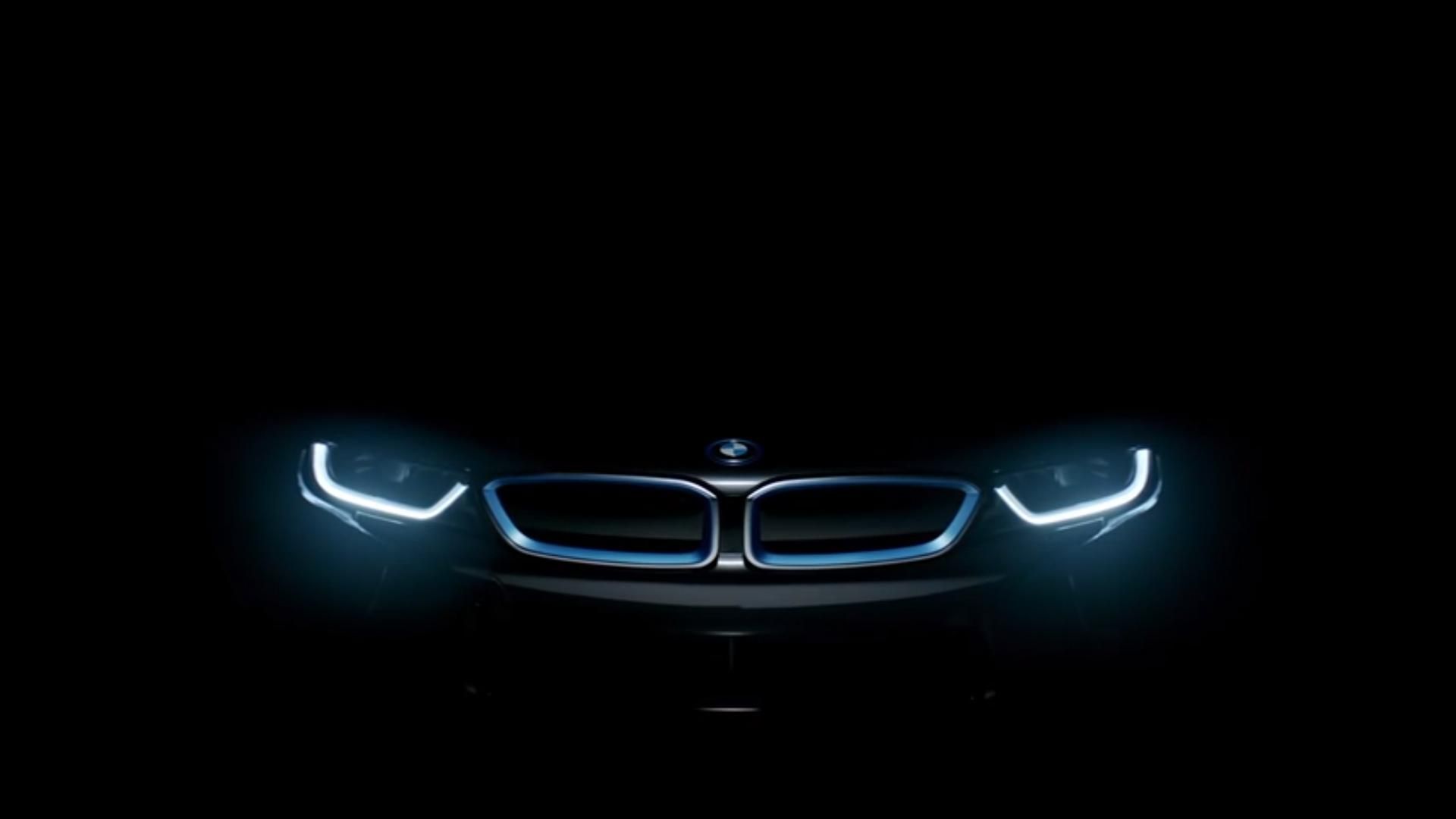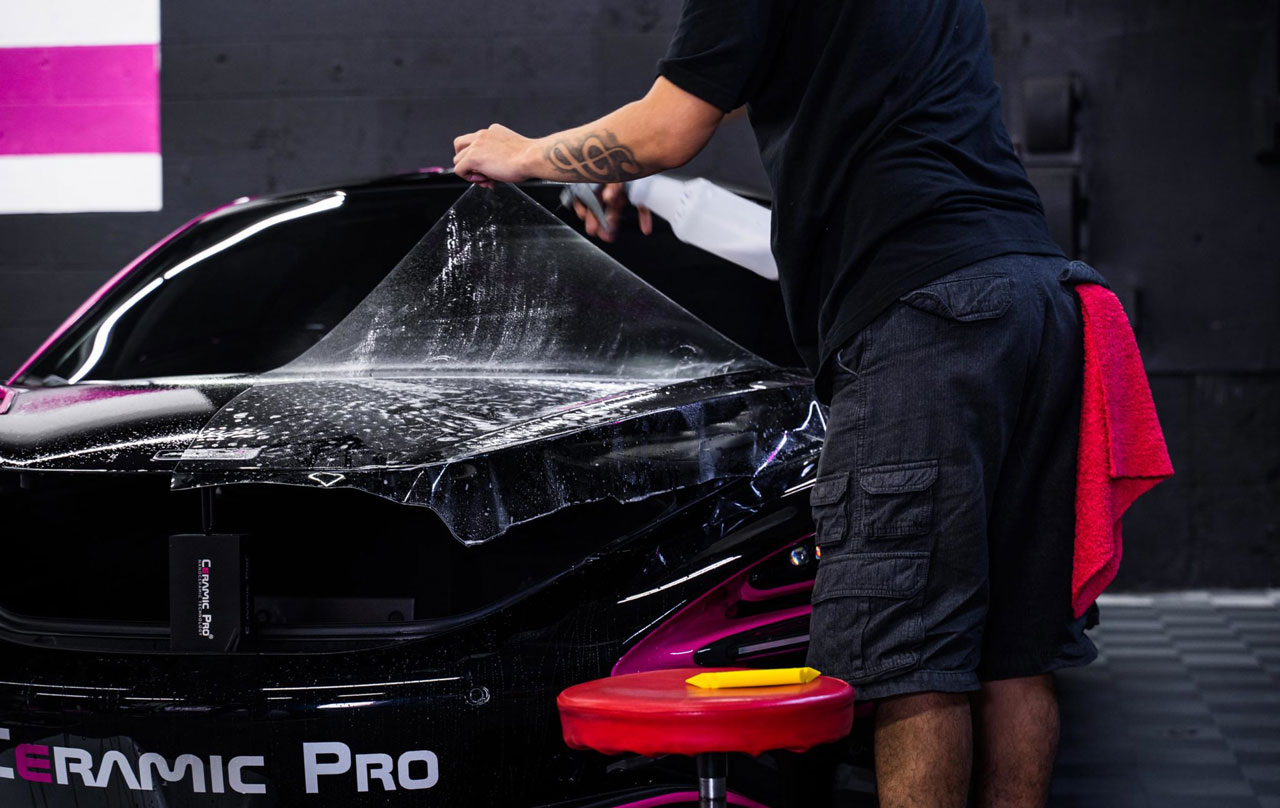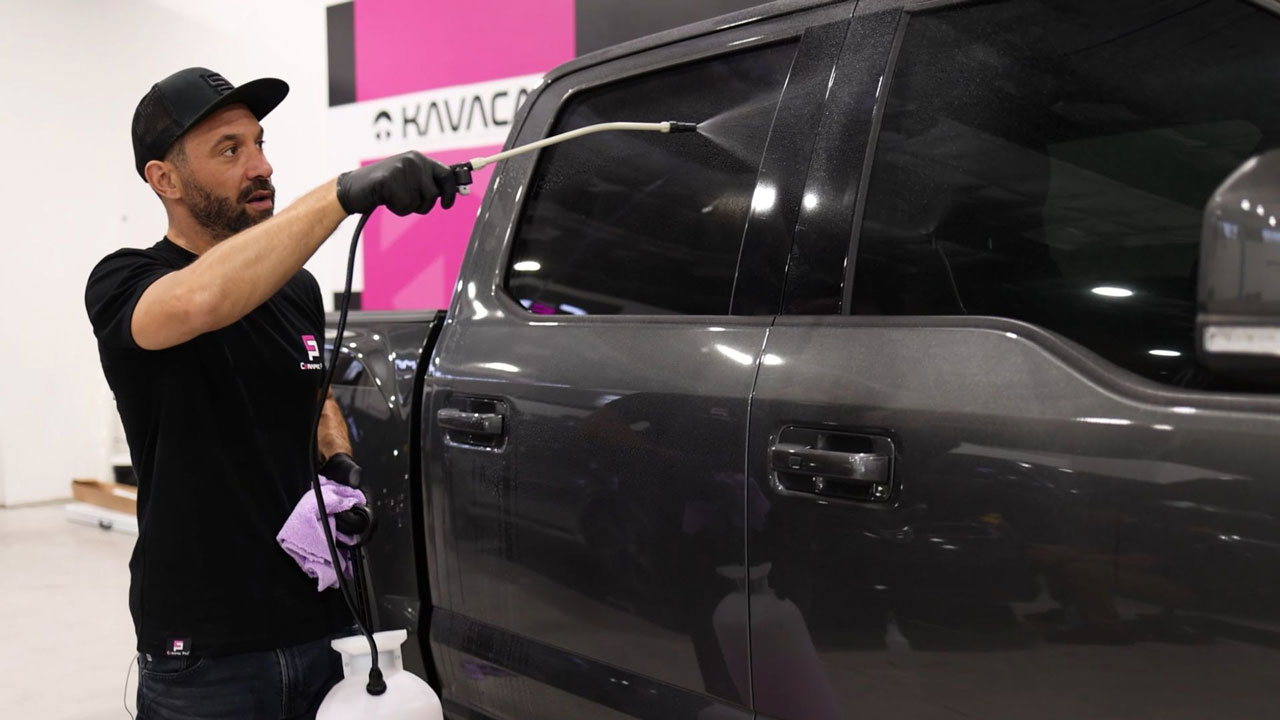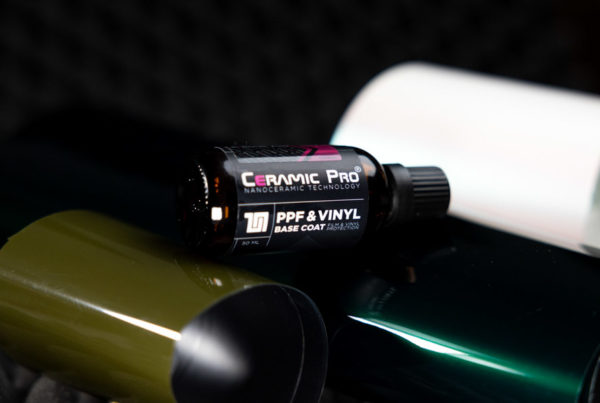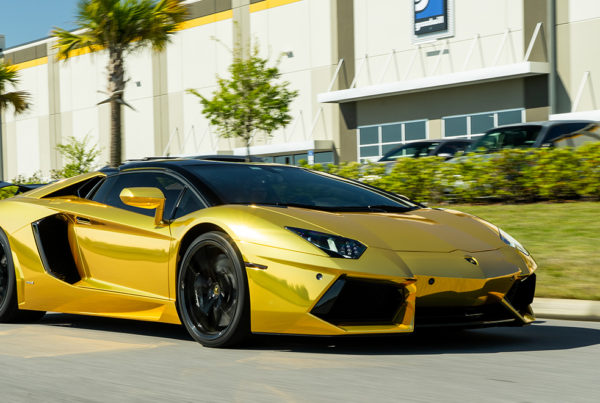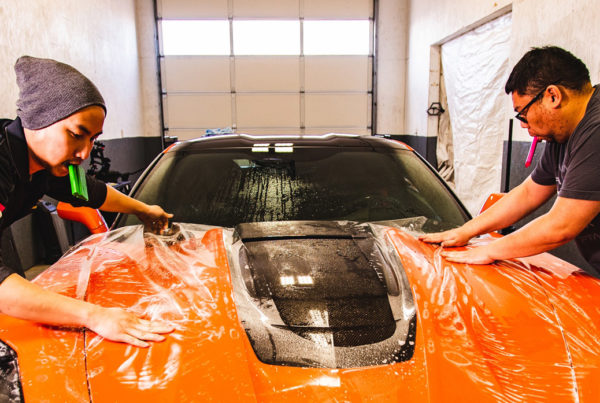So – how much did you spend for that full car wrap – $1,000 – $2,000, or maybe a few grand more? The average vinyl wrap is an investment of more than $1,500. And if you are going to spend that much money on an aesthetic and physical protectant for your factory paint job, it makes sense to protect a car wrap – right?
Vinyl does a great job of protecting your car’s paint surface from scratches. However, the material itself is not very hydrophobic, or durable. In fact, the simple act of using a drive-thru car wash can lead to scratching, and in some instances, tearing of vinyl material. Let’s face it – wrapping an entire vehicle comes with some risk – and reward.
With all that said, there are five simple tips that you can use that will reduce the wear and tear associated with vinyl wrap installation. We’ll also explain why it makes sense to use a professional-grade ceramic coating like Ceramic Pro 9H Vinyl and PPF to enhance that car wrap installed on your paint job. Let us break them down in the content below.
What is a Full Car Wrap?
Vinyl for cars is slightly different than those you would find on a billboard or pasted on your wall. It is a high-strength polyvinyl chloride (PVC) that is infused with an adhesive that helps it bond to smoother surfaces. Automotive vinyl is diverse, and can bond to glass, metal, plastics, and carbon fiber.
There are multiple types of protective films on the market today. Window tint is used to block harmful UV rays and keep a vehicle cooler inside. But, like window films, there are several wrap materials on the market today.
Some are made for decorative purposes only, like a matte wrap, chrome finish, or custom vehicle graphic designs, while others are intended to be applied to surfaces mainly for protections against exposure to harmful contaminants. Car wraps come in multiple colors and can be custom fit to pretty much any type of vehicle.
A full car wrap is typically custom cut by using a device called a plotter. However, if the vinyl wrap is not custom designed it is common for the installers to hand cut and install the material directly on the vehicle. For those not looking for a complete vehicle vinyl wrap installation, customized installations on specific parts or sections of the vehicle is also an option.
Did You Know Ceramic Pro Coatings are Affordable? Get a FREE QUOTE NOW!
Does Vinyl Heal Itself?
One of the most confusing myths about vinyl wrap is that it can be healed by using heat. While some vinyl materials have this capacity, the film that has these qualities is called paint protection film or PPF for short. PPF is installed and cut like vinyl car wraps, but that is where the similarities end. They are comprised of different materials, use different technology, and serve different consumer types. You’ll also hear the term clear bra associated with PPF.
Customers who seek out paint protection film are usually looking for a superior protective solution for the surface of their vehicle, mainly the paint surface, and front end or exposed sections that are prone to being hit by road debris. Vinyl wraps on the other hand are mainly for decorative purposes.
For superior protection both a paint protection film and vinyl wrap can benefit from the installation of a nano ceramic coating. This will help the film improve hydrophobic properties, which allows water and other debris to sheet off the surface with extraordinarily little effort.
If a vinyl wrapping is not protected by a nano ceramic coating or another customized vinyl protectant, it can and often will hold up for just a few years. UV rays, natural toxins and chemicals will slowly begin to deteriorate the vinyl surface. If the car wrapping installed on the car’s paintwork is struck by rocks or other road debris, it will tear and will require replacement.
How to Protect Vinyl Wraps
After reading the information above, you may be wondering whether it is a smart idea to install a vinyl car wrap in the first place. Well, just like any other aesthetic improvement, knowing how to protect it and keep it in good condition is a major contributing factor in deciding whether to purchase it.
So, let us explore five easy tips that any car owner can activate that will help to protect your car wrap and keep it looking in tiptop shape.
Tip #1 – Always Follow the Manufacturers Care Recommendations
If there is a problem that many car owners, specifically, do it yourself enthusiast have, it is following directions. However, if you are going to have a wrapped vehicle it is extremely important to follow the maintenance and care recommendations provided by the manufacturer of the vinyl material.
For the most part, all vinyl that is installed on daily drivers is comprised of the same based ingredients. While there are multiple finishes, colors, and qualities of vinyl wraps, the maintenance recommendations are simple for each one.
- Always hand wash your vehicle
- Never use an automated car wash
- Do not use strong chemical cleaners
- Avoid extended exposure to the elements
- Always use the recommended cleaning and aftercare products and techniques
The key is to follow the advice of the exact type of paint wrap material that is installed on your vehicle. If you have a 3M vinyl that has a Chrome finish, the care and maintenance instructions are likely going to be different then a cheap or entry level decorative car wrap.
When you have an installer of a wrapped car quote you the job, make sure to ask and consider the manufacturers care recommendations to determine whether you have the patience, ability, and skill to maintain an unprotected vinyl wrap.
Tip #2 – Be Careful Where You Park
Automotive vinyl is not hydrophobic by nature. In fact, anybody with a race car or a vehicle that burns rubber frequently, and has vinyl installed on their car can testify to what a pain in the butt it is to remove burnt rubber from the wrap. However, burnt rubber is not the only thing that will stick to a vinyl wrap.
Therefore, it is important to be careful where you park and keep your vehicle. Here are a few simple tips to consider when you have a factory installed or unprotected vinyl wrap on your vehicle:
Never park under trees: Trees have SAP, pollen, and other sticky items that will find a home on your vehicle wrap. Birds likewise spend lots of time in trees, and you can imagine what type of sticky stuff they produce that can fall and land on your beautiful vinyl wrap.
Try to keep your car in a garage: Another common source of premature wear on automotive vinyl materials is UV rays. By keeping your vehicle parked under a parking structure or in a garage specifically in daylight hours, you can significantly expand its life span.
Tip #3 – Wash Every Two Weeks
Just like any protective coating or material, routine maintenance is crucial for proper care. For a car wrap, most manufacturers recommend hand washing your vehicle every two weeks. Most professional detailers strongly suggest using the trusted two bucket method of washing. If you would like to learn more about how this type of washing is completed, this blog will help you.
If you have the luxury of having a high-pressure washer, you can use it to clean your vinyl wrap. However, it is incredibly important to use low pressure settings, and the lowest volume spray nozzles to ensure you do not damage or tear the vinyl material.
it is becoming more common for vehicles with vinyl wraps to use a waterless washing technique and materials. This video posted below or provide a guide on how to correctly use a waterless wash system.
Tip #4 – Beware of Chemical Cleaners and Treatment
Earlier in this article, we mentioned how important it is to use the right type of cleaners or cleaning agents with vinyl materials. There are some type of chemical cleaning agents or products that you should never use to remove stains, sticky contaminants, or other debris.
- Solvent-based cleaner
- Oil-based cleaner
- Kitchen or Bathroom Cleaners
- Citrus-based cleaners
- Engine degreasers or high pH washes
For optimal protection, always use a pH neutral, wax-free, and high-suds producing car shampoo. If you can find a vinyl and PPF car soap, that is the perfect type of shampoo to use on non and protected vinyl wraps.
Tip #5 – Always Use a Professional Grade Ceramic Coating
Most car wraps are going to cost the average consumer a few thousand dollars. If you are going to spend that kind of money on improving the look of your vehicle, it simply makes sense to use the best product possible to protect that wrap.
While there are multiple do-it-yourself ceramic coatings on the market, from sprays to cheap knockoff nano coatings, the truth is – you will always get what you pay for with any ‘ceramic coating’.
Ceramic Pro 9H Vinyl and PPF coating is specifically formulated for polyvinyl or PVC material – including that used in vinyl and paint protection film. It is not as aggressive as normal clear coat of paint coatings – but still utilizes nanotechnology to bond directly to those minor imperfections found on the film’s top layer. It also helps reduce vinyl’s orange peel look.
The complete protection program involves a base coat and top coat application. When completed correctly, it helps to provide multiple benefits:
- Super Hydrophobic Effect
- Weather & UV Resistance
- Anti-Graffiti
- Reduced Orange Peel
- Less Maintenance
- Extended Lifespan
- High Gloss Finish
When professionally applied by a certified Ceramic Pro installer, the vinyl wrap can extend its life expectancy by multiple years. Plus, dirt, debris, tree sap, bird droppings and bug splatters will be easier to remove in the future. If you’d like to receive a free estimate to have your vinyl wrapped car protected by Ceramic Pro 9H PPF & Vinyl coatings, click the button below.

